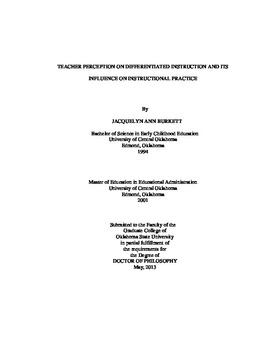| dc.contributor.advisor | Yellin, David | |
| dc.contributor.author | Burkett, Jacquelyn Ann | |
| dc.date.accessioned | 2014-09-24T14:16:27Z | |
| dc.date.available | 2014-09-24T14:16:27Z | |
| dc.date.issued | 2013-05 | |
| dc.identifier.uri | https://hdl.handle.net/11244/10960 | |
| dc.description.abstract | Differentiated Instruction is an approach to teaching which meets the diverse academic needs of students by considering learner readiness, interest and learning style. The approach is grounded in the socio-cultural, multiple intelligence and learning style theories. In addition, differentiation is a research based method for meeting the expectations of No Child Left Behind to raise the achievement of all students. Although current literature describes how to best implement differentiated instruction, there is a lack of research describing teacher perceptions on implementing the approach (Subban, 2006; Hall, Strangman, & Meyer, 2003). Thus, it is helpful to examine how teachers understand and perceive the influence of differentiation on instructional practices. The present study utilized the qualitative method of phenomenology to explore teacher perceptions connected to differentiated instruction and the influence of these on instructional practice. The study interviewed 11 intermediate elementary school teachers using interview questions to promote conversational dialogue. The interview questions afforded teachers opportunities to share their thoughts, feelings, and experiences pertaining to differentiated instruction. Data analysis revealed the following themes: 1.) Differentiated instruction is essential in an effective classroom, 2.) differentiated instruction occurs naturally, 3.) in-service professional development influences differentiated instruction, 4.) early schooling influences differentiated instruction, 5.) pre-service professional development influences differentiated instruction, 6.) differentiated instruction is prevalent and 7.) classroom environment conducive to learning. In addition the study found that teachers used the following differentiated instructional strategies: flexible grouping, tiered lessons, literature circles, and curriculum compacting. Consequently, this study supports differentiated instruction as an approach to learning while highlighting the influence of professional development on teachers' use of differentiated instruction. | |
| dc.format | application/pdf | |
| dc.language | en_US | |
| dc.rights | Copyright is held by the author who has granted the Oklahoma State University Library the non-exclusive right to share this material in its institutional repository. Contact Digital Library Services at lib-dls@okstate.edu or 405-744-9161 for the permission policy on the use, reproduction or distribution of this material. | |
| dc.title | Teacher perception on differentiated instruction and its influence on instructional practice | |
| dc.contributor.committeeMember | Giacobbe, Alice | |
| dc.contributor.committeeMember | Wang, Qiuying | |
| dc.contributor.committeeMember | Zhao, Guoping | |
| osu.filename | Burkett_okstate_0664D_12634.pdf | |
| osu.accesstype | Open Access | |
| dc.type.genre | Dissertation | |
| dc.type.material | Text | |
| dc.subject.keywords | differentiated instruction | |
| dc.subject.keywords | differentiated instructional strategies | |
| dc.subject.keywords | differentiation | |
| dc.subject.keywords | teacher perception of differentiated instruction | |
| dc.subject.keywords | teacher perceptions using differentiated instruction | |
| thesis.degree.discipline | Education, Professional Educational Studies | |
| thesis.degree.grantor | Oklahoma State University | |
